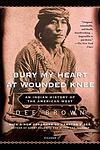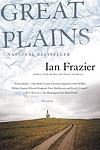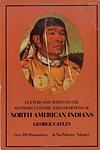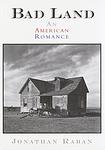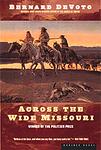The Greatest "West (U.S.)" Books of All Time
Click to learn how this list is calculated.
This list represents a comprehensive and trusted collection of the greatest books. Developed through a specialized algorithm, it brings together 284 'best of' book lists to form a definitive guide to the world's most acclaimed books. For those interested in how these books are chosen, additional details can be found on the rankings page.
Genres
The "West (U.S.)" category of books typically refers to literature that is set in or explores the history, culture, and landscape of the American West. This can include stories of cowboys and pioneers, Native American history and culture, tales of the Gold Rush and frontier life, and contemporary fiction and non-fiction that captures the unique spirit of the region. The West (U.S.) category is often associated with themes of rugged individualism, adventure, and the struggle for survival in a harsh and unforgiving environment.
Countries
Date Range
Reading Statistics
Click the button below to see how many of these books you've read!
Download
If you're interested in downloading this list as a CSV file for use in a spreadsheet application, you can easily do so by clicking the button below. Please note that to ensure a manageable file size and faster download, the CSV will include details for only the first 500 books.
Download-
1. Lonesome Dove by Larry McMurtry
The book tells the story of two retired Texas Rangers who embark on a perilous cattle drive from Texas to Montana in the 1870s. The narrative focuses on the duo's adventures and the characters they meet along the way, including a variety of outlaws, Indians, and settlers. This epic tale of the Old West explores themes of friendship, unrequited love, and the harsh realities of frontier life.
-
2. Bury My Heart at Wounded Knee by Dee Alexander Brown
This book is a compelling historical narrative that chronicles the systematic decimation of Native American tribes in the United States during the late 19th century. The author uses council records, autobiographies, and firsthand descriptions to provide a detailed account of the battles, massacres, and broken treaties that led to the destruction of the Native American way of life. The book centers on significant events such as the Battle of Little Bighorn and the Wounded Knee Massacre, offering a voice to the often overlooked Native American perspective.
-
3. Riders of the Purple Sage by Zane Grey
"Riders of the Purple Sage" is a classic Western novel that tells the story of a woman named Jane Withersteen, who is persecuted by her Mormon fundamentalist church community in Utah for her friendship with a non-Mormon man. She is protected by a mysterious rider known as Lassiter, a gunslinger who is seeking revenge for the death of his sister. The novel explores themes of religious intolerance, the struggle for personal freedom, and the violent frontier life in the American West.
-
4. The Bean Trees by Barbara Kingsolver
The novel follows the journey of a young woman from rural Kentucky who, on her drive west to avoid an unwanted pregnancy, is unexpectedly entrusted with a three-year-old Native American girl. The protagonist settles in Tucson, Arizona, where she builds a non-traditional family with a group of resilient and unconventional women. The narrative explores themes of love, friendship, and the power of the human spirit while tackling issues of social injustice and immigration.
-
5. The Frontier in American History by Frederick J. Turner
"The Frontier in American History" examines the importance of the unsettled, western frontier in shaping the political, economic, and social identity of the United States. The book argues that the constant westward expansion and the challenges it presented played a crucial role in developing American democracy, individualism, and innovative spirit. The author further posits that the closing of this frontier at the end of the 19th century marked a significant shift in American society, which now had to find new ways of growth and innovation.
-
6. Into the Wild by Jon Krakauer
This striking narrative non-fiction tells the real-life story of a young man who turns his back on society to live in the Alaskan wilderness. Despite a privileged background and a promising future, he donates his savings to charity, abandons his car and most of his possessions, and embarks on a journey into the wild. His solitary existence in the wild, his struggles for survival, and his untimely death provide a profound exploration of the allure of wilderness and the human yearning for solitude and self-discovery.
-
7. Journals by Meriwether Lewis, William Clark
This book is a compilation of the detailed journals kept by two explorers during their expedition across the American West, from 1804 to 1806. The journals provide a first-hand account of their encounters with Native American tribes, their observations of new plant and animal species, and the challenges they faced while traversing uncharted territories. The explorers' writings not only offer insights into their historic journey but also serve as a valuable resource for understanding early 19th-century American history and the country's westward expansion.
-
8. Great Plains by Ian Frazier
"Great Plains" is a travelogue that takes readers on a journey through the vast expanse of the American Great Plains, exploring its history, geography, and culture. The author travels from North Dakota to Texas, delving into the history of Native Americans, pioneers, and outlaws. The book provides a detailed account of the region, its people, and its significance in shaping the American West, offering a vivid portrait of the landscape and its influence on the country's identity.
-
9. A Lady's Life in the Rocky Mountains by Isabella L. Bird
"A Lady's Life in the Rocky Mountains" is a travelogue detailing the adventures of a female explorer in the 19th century as she traverses the rugged landscapes of the Rocky Mountains. The book offers a vivid account of her encounters with diverse wildlife, treacherous terrains, and the various people she meets along the way, including a notorious outlaw. The narrative presents a compelling portrait of the American West, while also reflecting on the unique challenges and freedoms experienced by a woman traveling alone during this period.
-
10. Roughing It by Mark Twain
This book is a semi-autobiographical travelogue that chronicles the author's journey across the American West to Nevada. It covers his experiences as a miner, newspaper reporter, and lecturer, and includes humorous and insightful observations about the people, places, and culture he encounters. The narrative also provides vivid descriptions of the natural landscape, as well as commentary on the social and political issues of the time.
-
11. Cadillac Desert by Marc Reisner
"Cadillac Desert" is a detailed exploration of the water crisis in the American West. The book delves into the history, politics, and environmental impact of water development in this region, highlighting the role of government policies and engineering projects. It also discusses the unsustainable use of water resources, the impact on local ecosystems, and the potential consequences of continued mismanagement, providing a comprehensive overview of a critical environmental issue.
-
12. The Exploration of the Colorado River by John Wesley Powell
This book is a firsthand account of the first U.S. government-sponsored passage through the Grand Canyon. The author, a one-armed Civil War veteran, and his team of nine men risked their lives to accomplish this feat in 1869. They faced dangerous rapids, food shortages, and potential attacks from Native American tribes. The narrative provides detailed descriptions of the geography, geology, and Native American inhabitants of the region, offering invaluable insights into the uncharted territory of the American West.
-
13. The Oregon Trail by Francis Parkman
"The Oregon Trail" is a historical account of a two-and-a-half month summer tour in 1846 of the U.S. states of Nebraska, Kansas, Colorado, and Wyoming. The book captures the experiences of the author and his companion as they journey from St. Louis to the Rocky Mountains and back. The narrative is rich with descriptions of the landscapes, wildlife, and people they encounter, including several Native American tribes. The book provides a vivid depiction of the West before industrialization and settlement.
-
14. Life in the Far West by George Frederick Ruxton
"Life in the Far West" is a vivid account of the early American frontier, highlighting the lives of trappers and traders in the Rocky Mountains. The narrative, based on the author's own experiences, provides detailed descriptions of the rugged lifestyle, the diverse characters encountered, and the often dangerous and violent events that occurred. It also offers an insightful look into the interactions between the settlers and the native tribes, making it a valuable historical resource.
-
15. The Adventures of Captain Bonneville by Washington Irving
This book chronicles the real-life expeditions of a U.S. Army officer in the American West. The officer, intrigued by the vast frontier, takes a leave of absence from the military to explore the wilderness, trade with Native American tribes, and hunt game. His adventures include encounters with various Native American cultures, survival in harsh conditions, and exploration of uncharted territories. The narrative presents a vivid picture of the American West during the era of Westward Expansion.
-
16. Letters and Notes on the Manners, Customs, and Conditions of the North American Indians by George Catlin
This book is a detailed and vivid account of the author's travels among the Native American tribes of the Great Plains during the 19th century. The author, an artist, presents an ethnographic record of his observations and experiences with different Native American tribes, including their customs, manners, rituals, and way of life. The book, which includes numerous sketches and paintings of tribal members and scenes, is considered a valuable historical record of Native American culture during this period.
-
17. Narrative of a Journey Across the Rocky Mountains to the Columbia River by John Kirk Townsend
This book is a first-hand account of an adventurous journey across the Rocky Mountains to the Columbia River. The author shares his experiences and observations from the trip, providing detailed descriptions of the terrain, wildlife, and Native American tribes he encountered along the way. His narrative offers a fascinating glimpse into the American West during the early 19th century, serving as both a historical document and a captivating adventure story.
-
18. Bad Land: An American Romance by Jonathan Raban
This book is a historical exploration of the American West, specifically the region of Eastern Montana. The author delves into the experiences of the British and Scandinavian settlers who were lured to this area in the early 20th century by railroad advertisements promising fertile farmland. Through a combination of historical research, personal narratives, and travelogue-style observations, the author paints a vivid picture of the harsh realities these settlers faced, including drought, isolation, and economic hardship. The book also reflects on the lasting impact of these experiences on the region's culture and identity.
-
19. Exploration and Empire: The Explorer and the Scientist in the Winning of the American West by William H. Goetzmann
The book discusses the exploration and scientific discovery that took place during the expansion of the American West. It highlights the role of explorers and scientists in shaping the American empire, arguing that their endeavors were not just about territorial acquisition but also the pursuit of knowledge. The book delves into the lives and contributions of notable figures, providing a comprehensive view of the westward expansion era, its challenges, and its lasting impact on America.
-
20. Across the Wide Missouri by Bernard DeVoto
"Across the Wide Missouri" is a historical narrative that explores the American fur trade in the 1830s, focusing on the Rocky Mountain fur trade. The book provides a detailed account of the lives of trappers, traders, Native Americans, and the rich ecosystem they inhabited. The narrative is filled with adventure, danger, and the vast beauty of the American West, painting a vivid picture of a pivotal era in American history.
Reading Statistics
Click the button below to see how many of these books you've read!
Download
If you're interested in downloading this list as a CSV file for use in a spreadsheet application, you can easily do so by clicking the button below. Please note that to ensure a manageable file size and faster download, the CSV will include details for only the first 500 books.
Download
